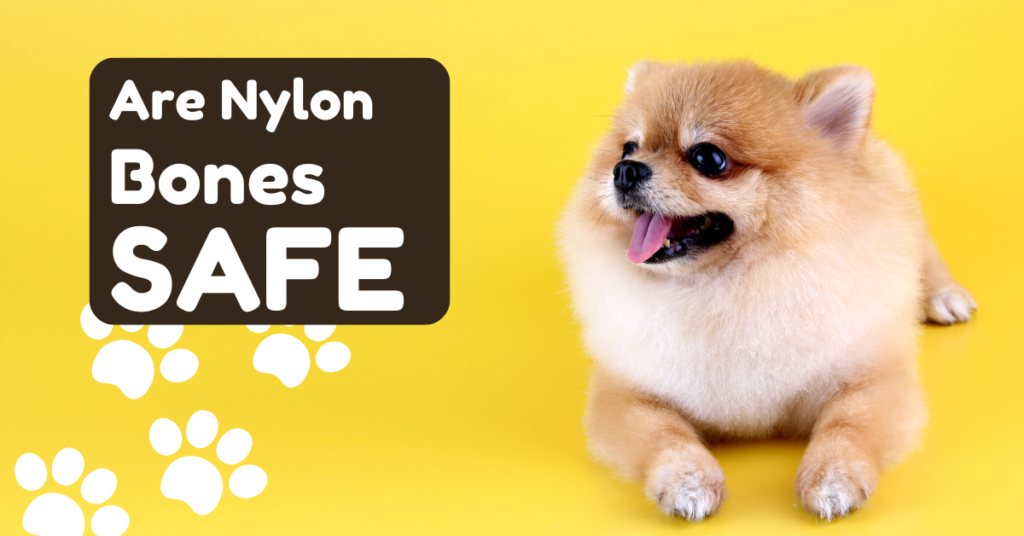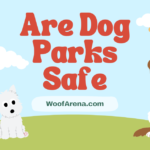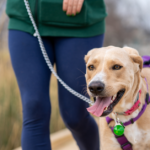Nylon bones are generally safe for dogs if they used correctly. It provides long-lasting chewing relief, help clean teeth, and reduce boredom. Safety depends on the dog’s chewing style and size. Heavy chewers may risk tooth fractures or swallowing sharp pieces. Always choose the right size and supervise chewing to prevent injury.
What Are Nylon Bones? Safety Basics
Nylon bones are synthetic chew toys made from durable nylon polymers. Brands often add flavors like bacon or peanut butter.
Are Nylon Bones Safe for Dogs? Yes for moderate, careful chewers. No for intense, “power” chewers with a history of tooth fractures or swallowing chunks.
Key point: If you can’t dent it with your thumbnail, many vet dentists say it’s too hard for teeth.
Benefits And Risks: Quick Overview
Are Nylon Bones Safe for Dogs if used right? Mostly, yes. But weigh both sides.
Benefits:
- Long-lasting chewing outlet
- Can reduce boredom and stress
- May help scrape soft plaque from tooth surfaces
Risks:
- Tooth fractures if the nylon is too hard
- Oral abrasions or gum irritation
- GI blockage if pieces are swallowed
Are Nylon Bones Safe for Dogs for puppies? Often no—baby teeth are fragile. Choose softer puppy-specific chews.
What The Research Says
I fact-checked this against veterinary dentistry reviews and peer‑reviewed studies available on Google Scholar.
- Tooth fractures: Veterinary dentists report that hard chews (like very hard nylon, antlers, hooves) are linked with slab fractures of the upper fourth premolar. Multiple clinical reviews and case series highlight this risk in adult dogs.
- Hardness matters: The “thumbnail test” and “kneecap rule” are common clinical guidelines from board‑certified dentists: if you can’t make a mark with a thumbnail, it’s likely too hard.
- Oral health: Studies show chewing can reduce plaque and calculus, but softer VOHC-accepted dental chews achieve similar benefits with lower fracture risk compared to very hard items.
- Foreign body risk: Retrospective studies of canine gastrointestinal foreign bodies list chews and toy fragments among common causes of obstruction, especially in young, enthusiastic chewers.
- Materials: Food-contact nylon grades are considered safe by regulators, but safety depends on design (surface texture, size), additives (avoid xylitol), and how your dog uses the product.
So, Are Nylon Bones Safe for Dogs? Evidence suggests they’re conditionally safe with thoughtful selection and supervision.
How To Choose A Safe Nylon Chew
Are Nylon Bones Safe for Dogs if you buy any random one? No. Choose with care.
- Size: Pick a chew bigger than your dog’s muzzle width. This makes swallowing a whole piece unlikely.
- Hardness: Use the thumbnail test. If you can’t indent it, skip it.
- Texture: Moderate texture is good. Extra-rough surfaces can sand teeth.
- Additives: Avoid chews with xylitol or unknown sweeteners. Flavors should be pet-safe.
- Origin: Prefer brands with clear quality controls and batch testing.
- Age and bite style: For puppies and seniors, choose softer nylon formulations labeled for their life stage.
Are Nylon Bones Safe for Dogs with strong jaws? Only if they’re softer, monitored, and replaced at first signs of damage.
How To Use Nylon Bones Safely
Follow these steps every time.
- Supervise: Stay nearby for the first 10–15 minutes. Watch how your dog chews.
- Time limit: Start with 5–10 minutes, then rest. Prolonged, forceful chewing increases tooth wear.
- Rule of thumb: If you hear hard “cracking” bites, it’s too hard or the wrong shape.
- Replace: Retire the chew once it becomes small enough to swallow or shows sharp edges.
- Rotate: Offer softer dental chews on some days to lower fracture risk.
Are Nylon Bones Safe for Dogs overnight? I don’t recommend unsupervised overnight access.
Key Risks Explained
I’ll break down the top issues I look for.
Choking And Blockage Risk
If a piece breaks off and gets swallowed, it can lodge in the stomach or intestines. Vomiting, loss of appetite, or belly pain needs urgent vet care. Are Nylon Bones Safe for Dogs that gulp food? Usually not—choose larger, softer alternatives.
Dental Wear And Fractures
Very hard chews can chip or crack teeth. The upper fourth premolar is most at risk. If your dog wins “tug-of-war with rocks,” nylon is probably too hard. Are Nylon Bones Safe for Dogs with perfect teeth? They still carry some fracture risk if the chew is too hard or used too long.
Material Safety And Additives
Nylon itself is a stable polymer, but flavor coatings vary. Avoid sweeteners, essential oils, or human-grade flavors that aren’t dog-safe. If your dog shows mouth redness or diarrhea, stop and switch. Are Nylon Bones Safe for Dogs with food allergies? Choose single-flavor, simple-ingredient options or unflavored nylon.
Safer Alternatives If Your Dog Is At Risk
If you’re worried about fractures or blockages, try these.
- VOHC-accepted dental chews (softer, proven plaque reduction)
- Rubber toys with a bit of give (look for slight compressibility)
- Edible dental treats designed to soften with saliva
- Frozen wet washcloth for teething puppies (supervise)
- Rawhide alternatives that soften as they’re chewed (supervise closely)
Are Nylon Bones Safe for Dogs that already chipped a tooth? I’d switch to softer options.
Vet-Reviewed Best Practices Checklist
Use this quick list before you buy or offer a nylon chew.
- Do the thumbnail test. If it’s too hard, skip it.
- Match size to muzzle—bigger is safer.
- Start with short, supervised sessions.
- Inspect teeth monthly for chips or wear.
- Replace at first sign of sharp edges or small size.
- Avoid risky additives; read labels.
- If your dog is a gulper, choose softer, edible chews.
Are Nylon Bones Safe for Dogs if I follow all this? They’re much safer, yes—but keep watching your dog’s chewing style.
FAQ’s
Are Nylon Bones Safe for Dogs With Sensitive Stomachs?
Yes, if they don’t swallow pieces and the chew is unflavored or simply flavored. Introduce slowly and monitor for vomiting or diarrhea.
Can Nylon Bones Break My Dog’s Teeth?
Yes. Very hard chews can crack teeth. Use the thumbnail test and limit long, forceful sessions.
How Long Should My Dog Chew A Nylon Bone?
Start with 5–10 minutes. Rest. You can repeat later. Long sessions increase wear and fracture risk.
What Size Nylon Bone Should I Buy?
Larger than your dog’s muzzle width. Avoid small chews that can be swallowed.
Are Nylon Bones Safe for Dogs That Are Aggressive Chewers?
Often no. Consider softer rubber, VOHC-accepted dental chews, or edible options designed to soften.
Conclusion
Are Nylon Bones Safe for Dogs? They can be—if you choose softer options, size up, supervise, and retire them early. Hard, unsupervised chewing raises the chance of tooth fractures and gut blockages.
I suggest you try the thumbnail test today, inspect your dog’s teeth, and pick a chew that fits your dog’s bite style. If you’re unsure, ask your vet or a board‑certified veterinary dentist for a quick chew‑toy check.
Want more pet health tips? Subscribe, leave a comment with your dog’s chew style, and I’ll help you pick safer options next.
I’ve loved dogs all my life and have cared for many different breeds over the years. Here, I share simple tips, stories, and helpful advice for all dog lovers. Whether you’re a new pet parent or a lifelong dog fan, you’ll find something useful and fun on my site.


